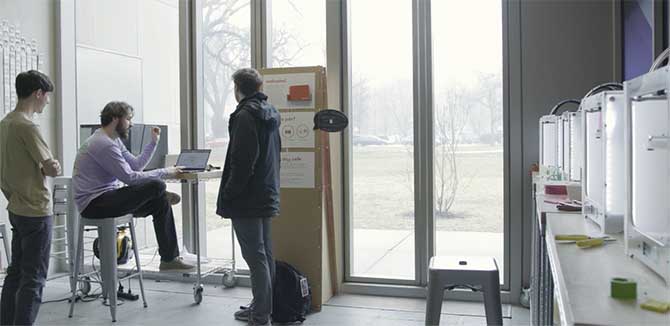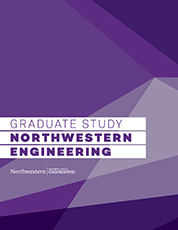Welcoming New Makers to the Corner Makery
Lucas Iezzi provided expertise without intimidation in an open-access makerspace on campus.

Professor Pam Daniels first met Lucas Iezzi (EDI '24) in the checkout line at Blick Art Materials in downtown Evanston. It was September 2022 and Iezzi, who just started Northwestern's Master of Science in Engineering Design Innovation (EDI) program, was buying materials to put the finishing touches on a complex, self-directed project due the next day.
As the two talked, one thing became abundantly clear to Daniels.
"Lucas has a huge passion for making," she said.
Iezzi found the shades of spray paint he needed for the levitating, blinking baby Yoda he designed, and went on to create what Daniels called "a compelling levitating desk toy." [Learn more about Iezzi's floating Yoda.]
That was the first time Daniels saw Iezzi's creative passion, but it wasn't the last. Iezzi went on to serve as an information session leader at the Corner Makery, a community-oriented makerspace on the ground floor of the Ford Engineering Design Center where EDI and the Segal Design Institute are housed. Daniels is the co-creator and faculty sponsor of the Corner Makery. The equipment available in the space spans 3D printing and desktop milling/CNC machining. Sewing machines are also available to borrow.
"I was the students' first point of contact with the space," Iezzi said. "I was there to break down the barrier of what they might not understand or might be intimidated by, and show them how to use the machines in a hands-on way."
Daniels was impressed by Iezzi's interaction with students.
"The goal is for students to rapidly learn the basics on how to use the equipment, and to do so in a way that feels inviting and encouraging — not intimidating," Daniels said. "Lucas did a great job embodying these values in making everyone from first-year students to PhD students feel welcome."
That was Iezzi's goal.
He embraced the challenge of helping students articulate how to transform two-dimensional drawings into three-dimensional thinking. He reveled in the moments when those same students could then explain the entire process themselves.
"I find that students need a little more encouragement to do anything hands-on," Daniels said. "Having a friendly face in the space to support student learning and experimentation really helped novices feel comfortable starting, and helped more seasoned makers troubleshoot, too."
The experience also helped Iezzi grow as a leader.
"It taught me the value of not giving up on communication, especially when it is clear that both parties are passionate about what they are describing but are just struggling to communicate it in ways that each other can understand," Iezzi said. "All it takes is patience."

